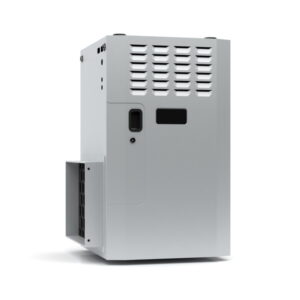There are times in life when we’re faced with big questions. Sometimes, that question is: Can I have my heating system repaired or is it time to replace it? And then, once that question is resolved—either the heating system is beyond repair, or it would cost so much that it simply isn’t worth investing all that money in an old heater—you’re immediately faced with another question.
When you do need to replace your heater, what should you replace it with? Have heating system technologies changed since you last had to purchase one? What heating system options are currently available? Which ones are good choices for this climate, for your home, for your family’s needs, or for your budget?
A Gas Furnace
This type of heating system combusts natural gas and uses the heat from that combustion to warm air, which is forced through ductwork and out the vents of your home. Gas furnace efficiency used to be around 70–80% (which means 20–30% of the energy expended running the furnace was lost and did not become heat for the home). Today, it’s easy to find a gas furnace with 90% efficiency, or even a specialty type called a condensing gas furnace with efficiency up to 98.5%.
Gas furnaces are common and familiar, and less expensive initially than electric ones. But they only last about 15 years, while other systems can last longer. The other potential downside is needing to be connected to your local natural gas utility. If your home isn’t already connected, that process will add to your installation costs, and in some cases, a home is too far from the lines to be connected at all. To learn more about the lifespan of a furnace and what to expect, check out how long you can expect your furnace to last.
An Electric Furnace
This type of heating system is 100% efficient because there is no exhaust of still-warm combustion gasses like you have with a gas furnace. Instead, every bit of energy it uses will become heat for your home. Amazing! Does this mean it’s cheaper to run an electric furnace? Not necessarily. Electricity is almost always a slightly more expensive energy source than natural gas.
Electric furnaces are less expensive at the outset, and they can last 20 years or so. And there’s no need to connect your home to a new utility as long as you have electricity. If you do happen to have solar panels, this will definitely be a very green option. However, for a smoother installation and optimal setup, make sure you understand why professional HVAC installation is important for the best performance and longevity.
A Heat Pump
The reason heating is so costly is that it takes a lot of energy to generate heat. But it doesn’t take much energy at all to move heat from one place to another. That’s what a heat pump does! This is by far the most efficient heating option, and it functions as an air conditioner as well.
If you’re concerned that a heat pump won’t work well enough during the coldest parts of the winter, you might be surprised how well it works while still being incredibly efficient. But this also depends on how well-insulated your home is. If you need a little more oomph to get through the coldest nights, dual fuel systems offer a backup heater which only kicks on when it’s needed. For tips on keeping your system efficient, see how to prepare your heater for winter with professional maintenance.
If you think you know which direction you’re leaning for heating installation in Cumming, GA, or if you’d like to talk through these possibilities in more detail, reach out today.
To speak with a member of our team, contact DC Cheek Heating, Cooling & Plumbing today. Fixed, At the Speed of Life!




